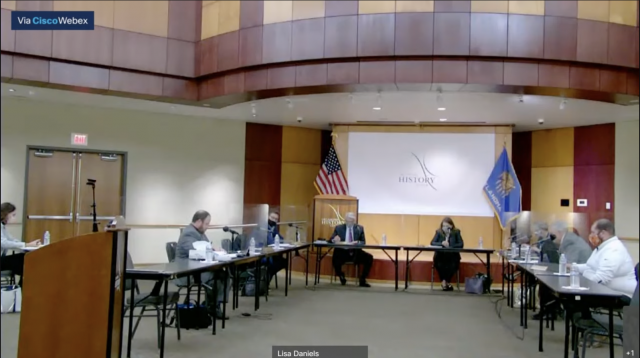

The Statewide Virtual Charter School Board held a special meeting this afternoon where members approved a motion to draft a new consent agreement to conclude charter termination proceedings with Epic One-on-One Charter School.
Epic attorney Bill Hickman and assistant Attorney General Marie Schuble will each submit new Epic settlement proposals with amendments requested by the SVCSB, such as full cooperation with the State Auditor & Inspector’s Office and the appointment of a compliance officer.
Epic’s governing board had proposed a settlement agreement at its April 14 meeting in an effort to resolve the SVCSB’s charter termination case, but the Statewide Virtual Charter School Board declined to accept their proposal today.
“I’d like to make a motion to have the parties, through their designated counsel, submit an amended consent order that includes, but is not limited to the sections that (SVCSB director) Dr. Rebecca Wilkinson will outline of the counter proposal,” said SVCSB Chairman Robert Franklin.
In October, the SVCSB voted to enter charter termination proceedings with Epic One-on-One owing to alleged contract violations, including a failure to meet the standards of fiscal management and violations of local, state, federal and tribal law. While Epic submitted a motion for summary judgement asking the SVCSB to dismiss certain allegations, it was denied at an April 6 meeting.
During Tuesday’s meeting, Franklin yielded 10 minutes to Hickman to present Epic’s original consent agreement.
“This consent agreement includes all of the terms requested by your executive director and then some,” Hickman said.
Epic’s proposed agreement included revisions to financial management, terms for contracting an educational management company, revisions to board governance, clarification of requirements for entering into inter-local cooperative agreements and an agreement to use a different internal auditor than years prior for the FY 2021 audit.
One of Epic’s major proposed changes would involve revisions to how the controversial learning fund is managed. Hickman said that, beginning July 1, the learning fund will be placed in public bank accounts, rather than private account management under Epic Youth Services, with expenditure records being made public.
“There’s no public employees reporting to private individuals or entities, there’s no private management company or individuals that will have access to public funds,” Hickman said. “No administration, no operations and no management powers or control reside any longer with the management company. What our relationship with Epic Youth Services looks like in the future is being discussed.”
Schuble was also given 10 minutes to provide objection to Epic’s proposed consent agreement and to offer a counter proposal. Schuble said Epic’s consent agreement, as presented, should not be approved because it does not go far enough to protect the interest of the state or the students enrolled at Epic.
“To settle this case short of termination, this board must require that Epic implement stricter financial operations, separation of schools and install proper governance,” Schuble said. “Nothing in the proposed consent agreement requires Epic to do anything more than it already has.”
Schuble said the consent agreement only glosses over Epic’s plan and will lead to continued disagreement. She told the board that her counter proposal specifies that the management company may not be a shared service and that utilizing the superintendent as a shared service between Epic One-on-One and Epic Blended is dependent on student enrollment numbers. Her counter proposal would also specify that agreements may not be made with out-of-state schools.
“Epic’s proposal is not an agreement and should not be used to dispose of this case. If this board does move forward with Epic’s proposed order, then I ask for my name and references to it being an agreement be removed from the document,” Schuble said. “If this board is inclined to order a settlement, then the counter proposal terms that I’ve proposed in my objection should be considered to ensure the state interests are protected.”
Hickman was given the opportunity to respond to Schuble’s objection.
“This board makes the decision whether or not to approve this agreement, period. Not Ms. Schuble, not the AG’s office,” Hickman said.
Hamrick sues SVCSB
The board also entered executive session to discuss a lawsuit filed in Oklahoma County District Court on April 13 by SVCSB member Mathew Hamrick. No action was taken after the board returned to open session. Rep. Mark McBride (R-Moore) exercised legislative authority to attend the executive session.
In the lawsuit, Hamrick requests that his forced recusal from voting on matters related to Epic be overturned and that the board not consider Epic related matters until his ability to vote, debate and discuss these matters is reinstated.
In December, the SVCSB approved a motion to recuse Hamrick, as well as board member Phyllis Shepherd, from voting on matters related to Epic One-on-One Charter Schools or hearing updates on the process to terminate the board’s charter authorization agreement with Epic owing to alleged conflicts of interest.
The investigative audit of Epic revealed that Hamrick had received political contributions totaling $200 for his 2017 Senate District 45 campaign from Epic co-founder David Chaney.
In court documents, Hamrick alleges that the donation to his campaign does not represent a conflict of interest and that the SVCSB violated the Administrative Procedures Act and Oklahoma Open Meeting Act when voting in favor of his recusal.
Read full Hamrick lawsuit
